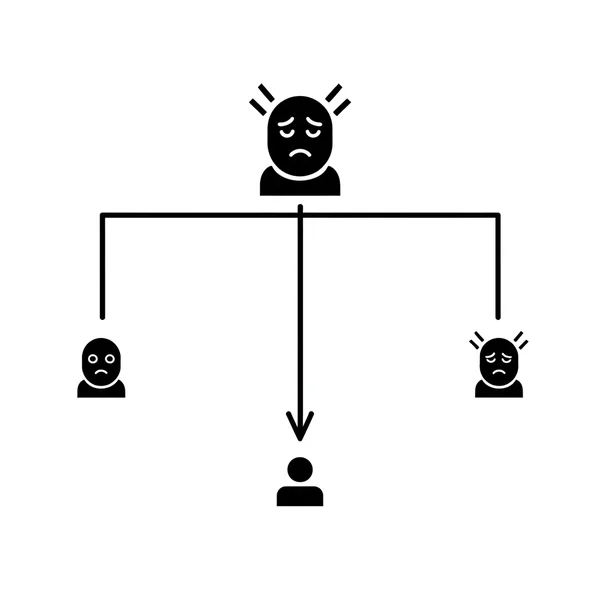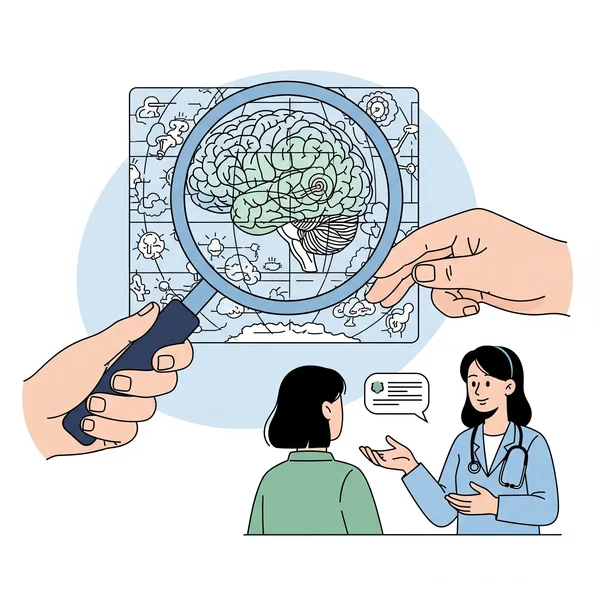Neurodivergence, Anxiety & Mental Health: The Overlaps
May 23, 2025 | By Morgan Hayes
Many people find themselves wondering about the intricate connections between their inner experiences. You might be asking, "am i neurodivergent or just mentally ill?" or trying to understand the anxiety neurodivergent link. The relationship between neurodivergence, anxiety, and other mental health conditions can indeed be complex and confusing. This article aims to untangle these concepts, explore their distinctions and overlaps, and crucially, emphasize why professional insight is vital for accurate differentiation. While online tools like the Neurodivergent Test can be a starting point for self-reflection, they are not substitutes for professional evaluation when trying to understand these differentiating conditions.
Defining Our Terms: Neurodivergence, Anxiety, and Mental Health Conditions
To navigate this topic, let's start by clarifying what we mean by each term. How to tell difference between neurodivergent and mental illness begins with clear definitions.
What We Mean by Neurodivergence (A Natural Variation in Brain Function)
Neurodivergence refers to natural variations in human brain function and behavioral traits. It encompasses diverse ways of thinking, learning, processing information, and interacting with the world. Conditions often included under the neurodiversity umbrella include Autism Spectrum Disorder (ASD), Attention-Deficit/Hyperactivity Disorder (ADHD), Dyslexia, and others. It's important to understand that neurodivergence itself is not an illness but a difference in neurological differences and wiring.
Understanding Anxiety (An Emotion vs. an Anxiety Disorder)
Anxiety is a normal human emotion characterized by feelings of tension, worried thoughts, and physical changes like increased blood pressure. Occasional anxiety is a typical response to stress. However, when anxiety becomes excessive, persistent, and interferes with daily life, it may indicate an anxiety disorder, which is a type of mental health condition.
Defining Mental Health Conditions (Diagnosable Conditions Affecting Mood, Thinking, Behavior)
Mental health conditions (often referred to as mental illnesses or psychiatric disorders) are diagnosable conditions that affect a person's thinking, feeling, mood, or behavior. Examples include depression, bipolar disorder, schizophrenia, obsessive-compulsive disorder (OCD), and various anxiety disorders. These conditions often cause distress and difficulty functioning in important areas of life and typically benefit from professional treatment and support.

The Complex Relationship: Neurodivergence and Co-occurring Anxiety
There is a well-documented anxiety neurodivergent link, with anxiety being a common co-occurring experience for many neurodivergent individuals. Is anxiety a sign of neurodivergence? Not directly, but the two are often connected.
Why Anxiety May Be More Common for Neurodivergent Individuals
Neurodivergent individuals may experience heightened anxiety for various reasons. These can include the stress of navigating a world primarily designed for neurotypical individuals, challenges with sensory processing, difficulties in social communication leading to misunderstandings, or the effort of "masking" neurodivergent traits to fit in. This ongoing effort and mismatch with the environment can contribute to chronic stress and anxiety.
Navigating a Neurotypical World: A Source of Stress
Constantly trying to adapt to neurotypical expectations in social situations, educational settings, or workplaces can be exhausting and anxiety-provoking. The feeling of being misunderstood or "out of sync" can be a significant stressor.
Sensory Overload and Its Link to Anxious Feelings
Many neurodivergent individuals have different sensory sensitivities. Overwhelming sensory input (bright lights, loud noises, strong smells, certain textures) can trigger anxiety and a desire to withdraw. This isn't a mental illness symptom in itself, but a reaction to an environment that isn't accommodating their neurological differences.
Social Differences and Potential for Social Anxiety
Differences in communication style or understanding social cues can sometimes lead to social anxiety. Fear of misinterpretation, judgment, or social rejection can make social interactions stressful rather than enjoyable, contributing to the neurodivergence and mental health overlap.
Is Anxiety Itself a Form of Neurodivergence?
This is a common question: is anxiety neurodivergent?
Clarifying the Distinction: Anxiety as an Experience vs. Neurotype
Generally, anxiety itself is not considered a form of neurodivergence in the same way autism or ADHD are. Neurodivergence refers to the underlying neurotype – the way the brain is wired. Anxiety is an emotional and physiological response that anyone can experience. While a neurodivergent brain might process experiences in a way that leads to more frequent or intense anxiety, the anxiety itself is a separate (though often related) phenomenon.
When Anxiety Becomes a Diagnosable Mental Health Condition
As mentioned, everyone experiences anxiety. However, when these feelings become persistent, overwhelming, and significantly impair daily functioning, it may be classified as an anxiety disorder – a diagnosable mental health condition that requires specific support and treatment, separate from but potentially co-occurring with neurodivergence.
Distinguishing Neurodivergent Traits from Mental Health Symptoms
Understanding the neurodivergent vs mental illness distinction is crucial, though often challenging without professional help.
Similar Presentations, Different Roots (e.g., social withdrawal)
Some behaviors or experiences can look similar on the surface but have different underlying causes. For example, social withdrawal in an autistic individual might stem from sensory overload or difficulty processing social cues, whereas in someone with social anxiety disorder (who may or may not be neurodivergent), it might stem from an intense fear of judgment. The "why" behind the behavior is key.

The Importance of Context and Underlying Causes
A professional assessment will delve into the context, developmental history, and underlying reasons for certain traits or behaviors. For instance, difficulty with emotional regulation could be related to a neurodivergent way of processing emotions or a symptom of a mood disorder.
Caution: Why Self-Interpretation Can Be Misleading
Trying to untangle these complexities on your own can be very difficult and may lead to self-diagnosis risks. It's easy to misattribute experiences or overlook important factors. This is why professional input is invaluable when asking "am i neurodivergent or is it just anxiety?"
When Neurodivergence and Mental Health Conditions Co-exist (Comorbidity)
It's very common for neurodivergent individuals to also experience one or more distinct mental health conditions. This is known as comorbidity neurodiversity or co-occurring conditions.
Understanding Comorbidity Neurodiversity: Having Multiple Conditions
Comorbidity simply means that two or more conditions are present in the same individual at the same time. For example, an autistic person can also have depression, or someone with ADHD can also have an anxiety disorder. Recognizing this is vital for comprehensive support.
Common Co-occurring Mental Health Conditions (e.g., Depression, OCD)
Research indicates that anxiety disorders and depression are particularly common among neurodivergent populations [Cite Reputable Source e.g., NIMH or specific studies]. Other conditions like OCD or eating disorders may also co-occur. It's important to explore these possibilities with a professional if you're seeking to understand the full picture of neurodivergence and mental health.
The Need for Holistic Support Addressing All Aspects
When neurodivergence and mental health conditions co-exist, holistic support that addresses all aspects of an individual's experience is essential. Treating an anxiety disorder, for instance, might involve different approaches if the person is also autistic, as the underlying contributors to their anxiety may differ.
The Critical Role of Professional Assessment in Differentiation
Do i need a diagnosis if i think i'm neurodivergent and also experiencing mental health challenges? Yes, for clarity and appropriate support, a professional assessment is critical.
Why Accurate Differentiation Matters for Effective Support
Accurately differentiating conditions – neurodivergent traits from mental health symptoms, or identifying co-occurring conditions – is crucial for developing effective support strategies. Misunderstanding the root cause of a challenge can lead to ineffective or even counterproductive interventions.

What a Comprehensive Professional Evaluation Involves
A comprehensive evaluation by a qualified professional (or team of professionals) typically involves in-depth interviews, reviewing developmental history, standardized questionnaires or tests, behavioral observations, and discussions about how various traits or symptoms impact daily life.
Avoiding the Pitfalls of Self-Diagnosis
Self-diagnosis, especially when trying to differentiate between neurodivergence and mental health conditions, carries significant self-diagnosis risks. It can lead to misunderstanding your needs, delaying appropriate support, or causing undue stress. Professional guidance helps avoid these pitfalls. You can learn more about what professional assessments entail here.
How Professionals Differentiate These Conditions: A Glimpse into the Process
Professionals use a multifaceted approach for differentiating conditions.
Looking at Developmental History and Onset
Neurodivergent traits are typically present from early development (though not always recognized until later in life). The onset and course of mental health symptoms can provide clues. For instance, an anxiety disorder might develop at a specific point due to particular stressors, distinct from lifelong neurodivergent ways of being.
Assessing Core Characteristics vs. Reactive Symptoms
Professionals aim to distinguish core neurodivergent characteristics (e.g., unique sensory processing in autism) from symptoms that might be a reaction to environmental stress or co-occurring mental health conditions (e.g., anxiety developed due to social difficulties).
Utilizing Standardized Measures and Clinical Interviews
Standardized diagnostic tools and in-depth clinical interviews help gather comprehensive information and compare an individual's experiences to established diagnostic criteria for various neurodevelopmental and mental health conditions.
Navigating Complexity: Seek Clarity, Not Self-Diagnosis
The interplay between neurodivergence, anxiety, and other mental health conditions is undeniably complex. While there are clear overlaps and anxiety neurodivergent links, they remain distinct concepts. Understanding these distinctions is vital, but attempting to self-diagnose in this intricate landscape can be overwhelming and misleading.
If you find yourself questioning, "am i neurodivergent or just mentally ill?" or struggling to understand your experiences, the most empowering step you can take is to seek guidance from qualified professionals. They can help you navigate this complexity, achieve diagnostic clarity, and access the support best suited to your unique needs.

Your Questions on Neurodivergence, Anxiety, and Mental Health
Is anxiety a sign of neurodivergence?
While anxiety is common in neurodivergent individuals, anxiety itself is not a core diagnostic criterion for a neurotype like autism or ADHD. It's often a co-occurring experience or a response to challenges faced by neurodivergent people. Disentangling this requires professional insight, and you can begin exploring these concepts on our site.
Can neurodivergence cause mental illness?
Neurodivergence itself is not a mental illness. However, the experience of being neurodivergent in a world not designed for neurodiversity can contribute to stress, trauma, and an increased risk of developing co-occurring mental health conditions like anxiety or depression.
How to tell difference between neurodivergent and mental illness?
This is a complex question best answered by a qualified professional. They consider developmental history, the nature and persistence of traits versus symptoms, the impact on functioning, and use standardized assessment tools. Self-assessment is not reliable for this.
Am I neurodivergent or is it just anxiety?
This is a very common question and one that highlights the confusion. Both can be true, or one, or neither. The only way to get a clear understanding is through a comprehensive professional assessment.
What mental illnesses are common with neurodivergence?
Anxiety disorders and depression are frequently reported as co-occurring conditions with neurodivergence. Other conditions like OCD and ADHD (if not the primary neurotype being considered) can also be present. A thorough assessment can identify any comorbidity neurodiversity.